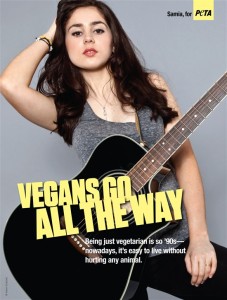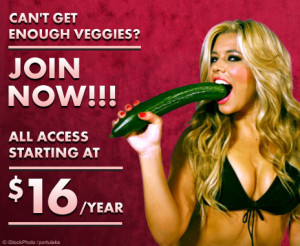In a previous article with One Green Planet, I documented the rising incorporation of sexist tactics and sexual objectification of women in Nonhuman Animal rights advocacy. Beyond the well-known and infamous PETA naked campaigns, more and more advocates are turning to the female body to promote veganism and rights for other animals.
In February 2013, a vegan pornography site “Vegan Pinup” relaunched brandishing the slogan: ”Because veganism is beautiful and sexy!” Like other vegan pornography sites, Vegan Pinup justifies the sexual objectification of female models with the presumption that images of “beautiful and sexy” naked or nearly naked women put veganism in an attractive light.
The website is set up like the popular alternative-lifestyle pornography site Suicide Girls, which runs on volunteer female models who submit their own images with varying levels of nudity based on the model’s comfort level. The model pays for the photographer, spends her own time having the photos taken, processed, and sent to the webmaster, and the webmaster then displays them on the website for paying customers. The models receive minimal compensation.
Vegan Pinup does not profit from customers who must pay to view the photographs (the photos are free to view), but they do profit from an extensive merchandise store. Unlike Suicide Girls, none of the vegan pinups receive compensation.
 Playboy models working for PETA draw attention to water usage in Nonhuman Animal products by sitting naked in a bathtub in a public square
Playboy models working for PETA draw attention to water usage in Nonhuman Animal products by sitting naked in a bathtub in a public square
Essentially what has happened is that the Nonhuman Animal rights movement, a serious movement advocating for social justice, has been co-opted by pornographers and mainstream sexism. The Nonhuman Animal rights movement is comprised of 80% women, yet it is led mostly by men. Men construct the theory and men dictate the tactics. Advocacy on behalf of other animals has become sexualized.
Women are being told that to advocate for veganism or Nonhuman Animal liberation means taking off their clothes and indicating sexual availability. Activism is no longer about discussing ethics, it’s putting the female body on display for male consumption. Veganism is now about sex, not social justice or political engagement.
Of course, body image is an important factor as well. For instance, while Vegan Pinup explicitly states that all body types are welcome, at this time, only thin women are pictured. More telling, the website repeatedly states the requirement that all models must demonstrate healthfulness, they must look “healthy.” This has implications not only for body weight (it is unclear how the webmaster decides the cut off on an “unhealthy” looking woman) but also for sexual availability. A pornography site can’t function unless it’s models appeal to men’s sexual appetite.
Sex cannot sell our movement . . . it can only sell out our movement. The proliferation of websites and tactics like Vegan Pinup speaks to the patriarchal infiltration of what was once a powerful site of female political presence. Encouraging women to strip for Nonhuman Animal rights is encouraging women to strip their personhood and become sexual objects. Instead of gaining empowerment through political action, women are told they are empowered by disrobing and looking “beautiful and sexy” for men.
 Playboy models working for PETA in lettuce bikinis insert veggie hot dogs into their mouths
Playboy models working for PETA in lettuce bikinis insert veggie hot dogs into their mouths
A plethora of research has demonstrated that the prevalence of sexually objectifying media degrades women’s self-esteem and can lead to mental health issues and eating disorders. A recent study in Psychological Science, however, has even asserted that sexual objectification leads women to internalize that objectification to the point of impaired self-efficacy. Women who are socialized to believe they are objects, in other words, are less likely to engage social activism that challenges that oppression. For a mostly female movement, increased objectification and reduced efficacy could prove disastrous.
This post was originally published by One Green Planet on March 15, 2013.
 Dr. Wrenn is Lecturer of Sociology. She received her Ph.D. in Sociology with Colorado State University in 2016. She received her M.S. in Sociology in 2008 and her B.A. in Political Science in 2005, both from Virginia Tech. She was awarded Exemplary Diversity Scholar, 2016 by the University of Michigan’s National Center for Institutional Diversity. She served as council member with the American Sociological Association’s Animals & Society section (2013-2016) and was elected Chair in 2018. She serves as Book Review Editor to Society & Animals and has contributed to the Human-Animal Studies Images and Cinema blogs for the Animals and Society Institute. She has been published in several peer-reviewed academic journals including the Journal of Gender Studies, Feminist Media Studies, Disability & Society, Food, Culture & Society, and Society & Animals. In July 2013, she founded the Vegan Feminist Network, an academic-activist project engaging intersectional social justice praxis. She is the author of A Rational Approach to Animal Rights: Extensions in Abolitionist Theory (Palgrave MacMillan 2016).
Dr. Wrenn is Lecturer of Sociology. She received her Ph.D. in Sociology with Colorado State University in 2016. She received her M.S. in Sociology in 2008 and her B.A. in Political Science in 2005, both from Virginia Tech. She was awarded Exemplary Diversity Scholar, 2016 by the University of Michigan’s National Center for Institutional Diversity. She served as council member with the American Sociological Association’s Animals & Society section (2013-2016) and was elected Chair in 2018. She serves as Book Review Editor to Society & Animals and has contributed to the Human-Animal Studies Images and Cinema blogs for the Animals and Society Institute. She has been published in several peer-reviewed academic journals including the Journal of Gender Studies, Feminist Media Studies, Disability & Society, Food, Culture & Society, and Society & Animals. In July 2013, she founded the Vegan Feminist Network, an academic-activist project engaging intersectional social justice praxis. She is the author of A Rational Approach to Animal Rights: Extensions in Abolitionist Theory (Palgrave MacMillan 2016).
Receive research updates straight to your inbox by subscribing to my newsletter.












